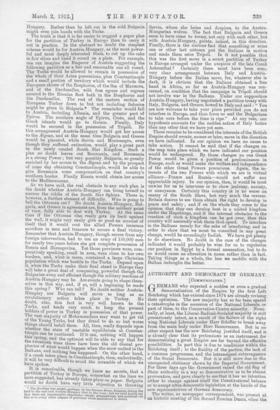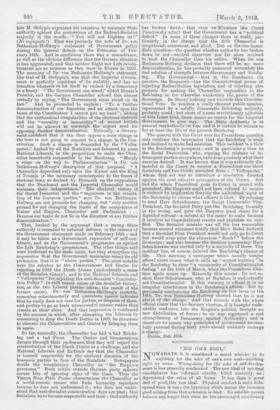AUTHORITY AND DEMOCRACY IN GERMANY.
[COMMUNICATED.]
GERMANS who expected. a sudden or even a gradual democratization of the Empire by the first Left Reichstag which has existed since 1874 are already revising their optimism. The new majority has so far been spared a catastrophe in the secession of the National Liberals, or part of them, to the Conservative-Centre minority. Nomi- nally, at least, the Liberal-Radical-Socialist majority is still precariously intact, as a result of the failure of the right wing National Liberals under Herr Schiffer to break away from the main body under Herr Bassermann. But in no other respect has the new Reichstag justified. itself, and it is already clear that its pretensions as an instrument for democratizing a great Empire are far beyond the effective possibilities. In part this is due to conditions within the Reichstag itself ; to the fluidity of the parties, the lack of a common programme, and the intransigent extravagances of the Social Democrats. But it is still more due to the unexpected obstinacy shown by the Imperial Government. For three days ago the Government raised the old flag of State authority in a way so demonstrative as to be almost provocative, and gave clearly to see that it has no intention either to change against itself the Constitutional balance or to accept ultra-democratic legislation at the hands of the now representatives of Gorman democracy. The writer, as newspaper correspondent, was present at an historic meeting of the Second Russian Duma, when the late M. Stolypin expressed his intention to maintain State authority against the pretensions of the Radical-Socialist majority in the words : "You will not frighten us !" (No zapugaete I) That was precisely the note of Dr. von Bethmann-Hollweg's statement of Government policy during the general debate on the Estimates of Feb- ruary 16th. And in conditions there was a resemblance, as well as the obvious difference that the German situation is less aggravated, and that neither Right nor Left revolu- tionaries are as extreme as they were in Russia in 1907. The meaning of Dr. von Bethmann-Hollweg's statement, like that of M. Stolypin's, was that the Imperial Govern- ment is perfectly confident of its stability, and has no intention whatever to let itself be rushed by a democracy in a hurry. "The Government can stand," added Russia's Premier, and the German Chancellor echoed this almost verbally by saying, "The Government must stand on its feet." And he proceeded to explain : "To a further democratization of our franchise and an attack upon the bases of the Constitution I cannot put my hand"; adding that the arithmetical irregularities of the electoral districts and the "morality or immorality" of second ballots will not be allowed to outweigh the urgent need for opposing further democratization. Naturally, a Govern- ment confident that it can thus oppose a mere change in the laws is not going to consent to a change in the Con- stitution. Such a change is demanded by the " Volks- partei," backed by all the Socialists and favoured by some National Liberals, in the proposition to make the Chan- cellor henceforth responsible to the Reichstag. "Merely a stage on the way to Parliamentarism " is Dr. von Bethinann-Hollweg's description of that proposal. "A Chancellor dependent only upon the Kaiser and the King of Prussia is the necessary counterpoise to the freest of electoral laws, so devised by Bismarck on the supposition that the Bundesrat and the Imperial Chancellor would maintain their independence." The electoral victory of the Social Democrat and the "vagueness in the orienta tion of the bourgeois parties," says Dr. von Bethmann- Hollweg are not grounds for changing, but "only another ground for not changing the limits of the competence of Kaiser and Empire, Chancellor and Parliament. . . . Because our tasks do not lie in the direction of any further democratization."
That, backed by the argument that a strong State authority is essential to national defence, is the essence of the Government statement made on February 16th; and it may be taken as a Government expression of self-con- fidence, and as the Government's programme as against the Left Reichstag's programmes. The other things said were irrelevant to the main issue, but they strengthen the impression that the Government maintains intact its old pretension that it is "above parties." The most notable were the rebukes to the Conservatives and Centre for rejecting in 1909 the Death Duties (undoubtedly a cause of the Socialist victory), and to the National Liberals and Volkspartei " for rejecting the anti-Socialist" Concentra- tion Policy" still nearer cause of the Socialist victory, but, as the two Liberal parties affirm, the result of the former cause). Dr. von Bethmann-Hollweg's irritable, somewhat schoolmasterly and. querulous speech indicates that he really does not care for parties, or despairs of them, and prefers to go as their unsuccessful master rather than remain as their slave. And that impression is confirmed by the manner in which, after alienating the Liberals by consenting to drop the Death Duties in 1909, he threatens to alienate the Conservatives and Centre by bringing them in again.
So far, naturally, the Chancellor has had a bad Reichs- tag and a bad Press. The Centre and Conservatives declare through their spokesmen that they will regard the reintroduction of the Death Duties as a challenge, and the National Liberals and Radicals say that the Chancellor is himself responsible for the electoral disunion of the bourgeois parties in face of the Socialists. Newspapers deride the complaining Chancellor as "the Empire's governess." Even critics outside German party spheres accuse him of ignoring signs of the times. Thus the Vienna Neue Freie Presse characterizes the Chancellor as a world-remote censor who finds humanity reprobate because he does not understand it ; who does not under- stand that anti-Socialist concentration days are past ; that Socialists have become respectable and tame ; that authority has broken down ; that even ex-Ministers like Count Posaclowsky admit that the Government has a "political deficit." In some of these charges there is truth, par- ticularly in the charge that the fifth Chancellor is magisterial, censorious, and aloof. But on the one imme- diate question—the question whether authority has broken down or not—neutral observers are far more inclined to back the Chancellor than his critics. When Dr. von Bethmann-Hollweg declares that there will be no more democratization, he has probably measured accurately the real relation of strength between Government and Reichs- tag. The Government — that is, the 13undesrat (in practice, the Emperor)—has the Constitutional power of rejecting Redistribution legislation, and of rejecting also projects for making the Chancellor responsible to, the Reichstag or for otherwise weakening the power of the Sovereign. In theory nothing can override this Constitu- tional Veto. In practice a really clamant public opinion, represented by a solidly democratic Reichstag majority, probably could ; but short of a semi-revolutionary agitation of this latter kind, there seems no reason for the Imperial Government to give way. The State Authority is at present emphatically on top, and it is certain to remain so for at least the life of the present Reichstag.
The quarrel with the Court over the Praesidium question only confirms the impression that the Reichstag is weak and inclined to make bad mistakes. This incident is a blow to the Reichstag's prospects ; and in particular a blow to the Social Democrats, who, copying the mistake of in- transigent parties everywhere, have done precisely what their enemies desired. It was known that it was extremely dis- tasteful to the Court to receive a Praesidium one-third Socialists and two-thirds recruited from a " Volkspartei," whose first act was to introduce a resolution directed against the most effective prerogative of the Crown. But had the whole Praesidium gone to Court in accord with precedent, the Emperor could not have refused to receive it without by implication denying the undoubted right of the Reichstag to choose what officers it likes. By refusing to send Herr Scheidemann, the Social Democratic Vice- President, the Socialist Party put the Reichstag formally in the wrong, and gave the Emperor good cause for a dignified refusal—a refusal all the easier to make because it involves no Constitutional results and provokes no con- flict. The Socialist mistake was all the less reasonable because several witnesses testify that Herr Bebel declared that a Socialist First President would not only go to Court but would even utter the obnoxious " Hoch ! " before the Sovereign ; and also because the'decision concerning Herr Scheidemann was carried only by a majority of three. The incident has, of course, injured the Reichstag's chance of life. This morning a newspaper which usually images official views issues what it calls an "urgent warning" to the Reichstag to show "a community of Constitutionalist; feeling" on the 13th of March, when the Praesidium Elec- tion again comes up. Naturally this means : Do not re- elect Herr Scheiclemann, who, as Socialist, is undoubtedly not Constitutionalist. If this warning is official it is an irregular interference in the Reichstag's affairs. But by personally condemning the Reichstag on this issue on the 16th, Dr. von Betlimann-Hollweg showed that he is not afraid of the charge. And that accords with the whole official claim that the January election, if it brought nude- sirable confusion into the Empire's politics, brought no new distribution of forces ; in no way registered a real strengthening of Democracy against Authority ; and is therefore no reason why principles of government success- fully pursued during forty years should suddenly undergo a change.
Berlin, Feb. 19th.











































 Previous page
Previous page